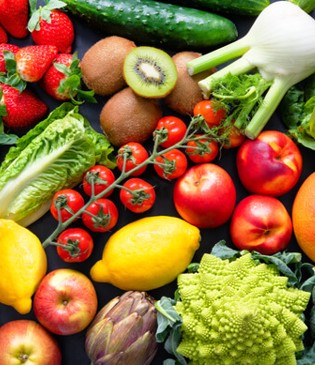Despite the appeal of shiny new technological advances in medicine, the link between nutrition and health remains strong.
Many people, including health care professionals, don’t yet appreciate the sheer magnitude of benefit possible from simple dietary changes. Here’s a cardiologist’s version of nutrition highlights, along with some MVPs (Most Valuable Plants).
Prevention of Diabetes
A simple lifestyle-based program of dietary changes and weight loss was shown to prevent progression to full blown diabetes twice as effectively as the most potent diabetes medicine. You might imagine that the lifestyle changes needed to make that happen were extreme. Nope! In the Diabetes Prevention Program study published in the New England of Medicine Journal, a simple diet that resulted in a mere 4 pounds weight loss per year, added to about 30 minutes of brisk walking every day, was enough to stop the progression to full diabetes.
Blood Pressure Lowering
Is it possible that eating 8-10 servings of fruit and vegetables a day, along with a lower salt diet, could reduce blood pressure as much as a potent blood pressure medicine? That’s exactly what was found in the DASH diet study—a blood pressure drop of 11mmHg! That’s not enough for some people with blood pressure problems, but why not at least lock in the benefits from diet and minimize the need for medication? An added bonus: it only took 2 weeks for the diet to lower blood pressure.
Reduced Chance of a Stroke
In the PREDIMED study, a Mediterranean-style diet reduced the risk of vascular disease, especially strokes, by 30% compared to a control group. The Mediterranean-style diet includes more vegetables and fruit than the typical American diet, whole grains in place of refined, less red meat and more fish, more nuts, and extra virgin olive oil as the predominant oil. Perhaps even more benefit is possible by substituting plant for animal food sources. A stroke is understandably one of the most feared vascular complications. Why not put dietary changes front and center to stack the deck in your favor?
Already Had a Heart Attack? Food Power Lowers the Risk of a Second Helping
The Lyon Diet study, published over 15 years ago, showed that after a heart attack, adopting a Mediterranean-style diet reduced the risk of a recurrence by 72%—an unprecedented benefit. After a heart attack, a number of medications are literally life-savers, including aspirin, a statin for cholesterol, and others depending on the situation. But all too often, the dietary “treatment” is lost with the single-minded focus on medication and never gets the attention it deserves. 72% worth of attention!
Some MVPs (Most Valuable Plants) for Optimal Health
- Dark green leafy vegetables—Greens like kale, spinach, and Swiss chard have special potency for lowering heart risk. No clear explanation as to why, but we really don’t need to know—they just work! Make sure to add some dark greens into your salads and entrees every day.
- Nuts—Walnuts and almonds are best studied, but all nuts (including peanuts) reduce heart risk and are remarkably linked to improved survival. Nuts contain healthier oils, magnesium, Vitamin E, and more. Go for a handful every day or two.
- Blueberries and strawberries—Deep red and blue fruits contain the powerful antioxidant anthocyanin, which is linked to reduced risk of heart disease, lower blood pressure, and improved cognitive function. Frozen or fresh, served plain, in oatmeal or smoothies, blueberries and strawberries are a most worthy addition to the Most Valuable Plant list!
References:
Diabetes Prevention Through Lifestyle
Diet and Risk of Vascular Disease
Mediterranean Diet After a Heart Attack
Interested in eating better for your own health?
Learn the essentials of good nutrition in our interactive, user-friendly nutrition learning program for the public.
Clinicians: Do you feel confident responding to patient questions about nutrition?
Take our award-winning condensed interactive nutrition CME—and learn what every clinician should know about nutrition.



